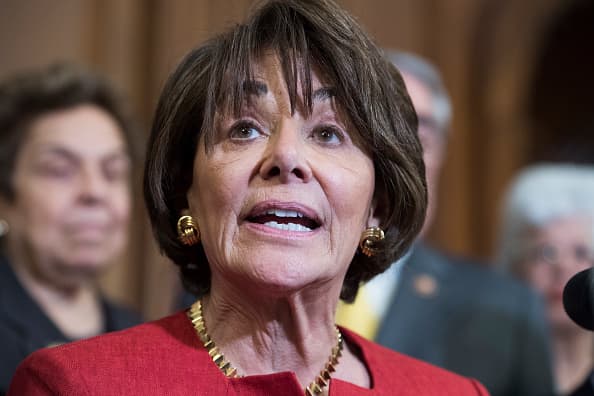At his fourth congressional testimony since July, Facebook CEO Mark Zuckerberg plans to offer his own suggestion for reforming the legal shield that protects his platform from liability for users’ posts. But two House Democrats said Wednesday that it’s nothing more than a red herring.
Rep. Anna Eshoo, a California Democrat whose district includes Silicon Valley, called Zuckerberg’s proposal a “masterful distraction” during a virtual press conference Wednesday. Rep. Tom Malinowski, D-N.J., said it’s “a classic example of Facebook hoping that we miss the point.”
Eshoo sits on the Energy and Commerce Committee and will have the opportunity to question Zuckerberg on Thursday.
In his prepared remarks released ahead of Thursday’s hearing before two subcommittees of the House Energy and Commerce Committee, Zuckerberg suggested that platforms should be held accountable based on their general adherence to best practices for addressing unlawful content, rather than for individual posts that slip through the cracks. He wrote that the adequacy of the moderation systems should depend on the size of the platform and be set by a third party.
Eshoo and Malinowski disagreed, and offered their own approach to reforming Section 230 of the Communications Decency Act in a bill they reintroduced on Wednesday.
Lawmakers on both sides of the aisle have been pushing to change the law, considered foundational for the internet, to remove some of its protections for the largest of the tech giants. But tech advocates say even seemingly small changes could disrupt services that all internet users have come to rely on.
Eshoo and Malinowski’s “Protecting Americans from Dangerous Algorithms Act,” seeks to take a narrow approach to reform. The bill would remove immunity under Section 230 in cases where a platform’s algorithm has amplified or recommended a post directly relevant to a case involving acts of international terrorism or civil rights violations.
Malinowski said the idea of the bill is to focus on the root problem, which is a business model that relies on convincing users to spend more time on the site, even if that means promoting inflammatory or divisive content. He said that Facebook seeks to distract from this basic model.
“They want us to focus on putting out fires, and not on the fact that their product is flammable,” he said. “Facebook’s algorithms cause the spread of the very content that they are then forced to remove. And so what we are trying to do in this bill is to focus the attention of Congress on how the engine actually works.”
Sen. Ron Wyden, D-Ore., who co-authored Section 230 back in the 1990s, similarly criticized Zuckerberg’s suggestions for reform in a statement. Wyden has remained cautious about attempts to alter the bill he helped write, and accused Zuckerberg of using the suggestions for his own gain.
“Mark Zuckerberg knows that rolling back Section 230 will cement Facebook’s position as the dominant social media company and make it vastly harder for new startups to challenge his cash cow,” Wyden said in the statement. “Everyone working to address real issues online should be deeply wary about Mark Zuckerberg’s proposals for new regulations.”
Wyden referenced Facebook’s support of SESTA-FOSTA, a package that was passed into law in 2018 to remove liability protection for sites that hosted solicitations of sex work or trafficking. The law essentially shuttered parts of the internet and sex work advocates have claimed it has made the industry less safe.
He also critiqued his fellow lawmakers for hosting several hearings with the same CEOs.
“Zuckerberg’s testimony is another reminder that Congress can’t craft smart tech policy if it keeps holding hearings featuring the same three big tech CEOs,” he said. “Pretending the internet is only Facebook, Twitter and Google will lead to laws that ensure that’s the result.”
Eshoo and Malinowski made two key changes to this iteration of their bill to focus it more directly on the largest social media platforms. First, they lowered the small business exemption from platforms with less than 50 million users to those with less than 10 million. And second, they added an exemption for internet infrastructure companies, like those that store data, provide cybersecurity or web hosting services, since they are not the main targets of the reform.
Zuckerberg will face congressional members alongside Google CEO Sundar Pichai and Twitter CEO Jack Dorsey on Thursday beginning at 12 p.m. Eastern Time.
WATCH: The big, messy business of content moderation on Facebook, Twitter, Youtube



